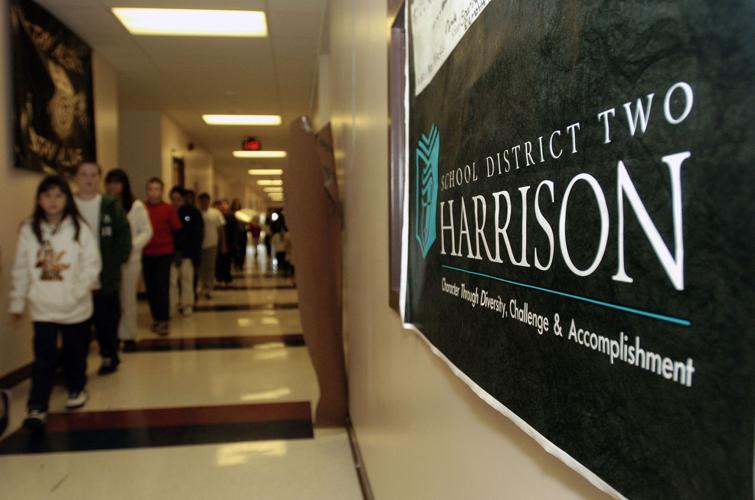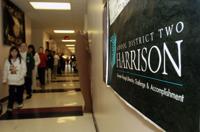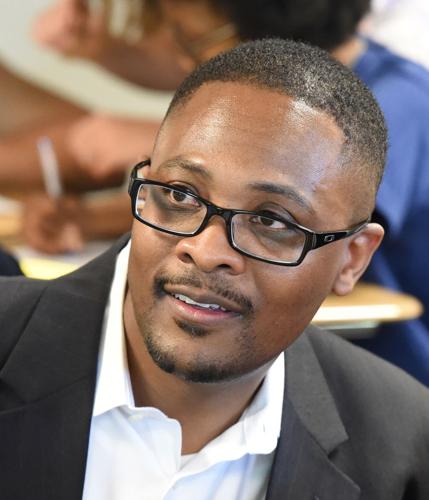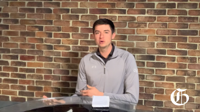Harrison School District 2 is hemorrhaging employees.
Already this year, 224 employees have resigned, including 131 teachers and 15 administrators, according to D-2's Human Resources Department. Five principals are among those departing.
"There's been a tide of departures from all levels recently," D-2 board President Steve Seibert said at a May 10 board work session called after the sudden resignation of Superintendent Andre Spencer.
After the five-member board, operating with one vacancy, accepted Spencer's resignation on May 7, it's now up to the board to stanch the bleeding.
No interim superintendent has yet been named, and board members have decided to assume some of the superintendent's duties, including hiring administrators, they announced.
"We want to send a strong message that the board is focused," Seibert said. "We want to build a positive team. We have morale that needs to be bolstered."
To do that, the board will take a hard look at the district's pay-for-performance compensation model, which is thought to be among the reasons Spencer left.
It's unclear whether Spencer, who had led the district for more than five years, was forced out or resigned of his accord.
He quit three weeks short of the school year ending and with more than two years left on his contract, but the circumstances have not been made public.
Under Colorado's open meetings law, elected boards can meet in private executive sessions to discuss issues such as personnel matters and not reveal the content of the conversations.
D-2 will undergo a routine audit in June, said spokeswoman Christine O'Brien, but that the district's finances had nothing to do with Spencer's departure. "That's an emphatic 'No,'" she said.
At its May 17 meeting, the board approved a 3 percent across-the-board salary increase and board members have been reviewing financial records to prepare for compensation boosts, O'Brien said, adding it's the first increase for all employees in "a long time."
Former D-2 board President Deborah Hendrix, who in the fall of 2012 voted to hire Spencer, said she was shocked to hear he had stepped down.
Spencer got the job because of his "focus on children, his no-excuses attitude and his ideas of how he could continue to make sure D-2 was progressing forward," Hendrix said.
"I believe he performed very well," she said. "It's a challenging district that's very diverse and has families with many needs. I was surprised and not pleased that he left."
Some complained that they didn't like his direct, sometimes stern, leadership style. But Hendrix said that's what's needed in a district that faces multiple challenges.
"Are there always people who don't necessarily like leadership and changes? Absolutely," she said. "In everything I've heard, the district is still moving forward, and Andre leaves an incredible legacy that shouldn't be forgotten."
A 'broken' system
Spencer's contract was to have expired June 30, 2020. His base salary for this school year was $172,429, with total compensation of $252,429.20, which included merit pay and benefits such as a car lease, a cellphone and health insurance. That ranked him among the top-paid superintendents in the region.
The settlement agreement the board offered is $250,000 to be paid in a lump sum by Aug. 30 as "full and final payment," according to documents obtained in an open records request.
Spencer also received a letter of recommendation from the board.
Evaluations of Spencer since his employment began in 2012 have been largely positive.
In last year's review, board members called him "tireless, positive, solution-oriented and unerringly focused on students," and praised the growing local, state and national recognition of his skills.
Areas cited as needing improvement in recent years were building staff culture, as only 60 percent of staff responded favorably to "stakeholder input," rather than the 80 percent target. The board mentioned concern about a broad succession plan and staff retention, among other issues.
In 2016, Spencer earned the top of the scale "exemplary effectiveness" and received a $20,000 raise.
Many speculate the main problem in D-2 is what Pueblo teachers recently went on strike to protest: compensation.
Harrison D-2 was among the first in the state to implement a pay-for-performance system in 2010, as the state was reforming its teacher effectiveness and evaluation methodology. State leaders used Harrison's model to help craft new standards that are now in effect for all public school districts.
Former Harrison board member Victor Torres liked the merit-pay idea - in which teachers, principals and some other staff including the superintendent can earn higher levels of pay for meeting certain effectiveness benchmarks - and eight years ago voted to adopt it.
"The system was good. The teachers were getting very competitive pay, and there were results in the classroom," he said. "But now, the system's broken."
Neither raises nor cost-of-living adjustments have been made to the compensation schedule, Torres said, so salaries are no longer competitive with nearby school districts.
Small changes in cut points have been made almost annually, O'Brien said. But "the whole system and how it's implemented has not changed," she said. "There's never been a 2.0 version."
Several other districts have succeeded in getting financing measures approved by voters in recent elections to, in part, boost salaries.
Harrison has distributed one-time stipends over the years, which Torres said has not met staff needs.
A training ground
Among the Pikes Peak region's 17 public school districts, Harrison D-2 has had the highest turnover rate of teachers for years, with this year's rate of 26.64 percent of all jobs and 26.89 percent turnover for teachers, according to Colorado Department of Education data.
But the 131 resignations of teachers so far this year is higher than in the past, said O'Brien.
"Understand that we are very aware and concerned," said board member Linda Pugh. "I look at the names of people leaving; these are qualified people who've been in the district for years."
But Harrison always has been known as a training ground for teachers, said Hendrix, who, even though she no longer serves on the board, remains an active volunteer in D-2.
"It's been the history of the district for quite some time," she said. "People know they can come here and get good, powerful training because we know how to work with the challenging students. Then you go somewhere else and sprout your wings."
And Harrison draws a lot of military employees as well as students, who frequently move, some point out.
It's clear that swift action needs to be taken to keep the region's most socio-economically diverse district on track. Spring is prime time for hiring new staff, and decisions must be made.
"We want to bolster morale, give buildings autonomy to build their teams and find the best fit," Seibert said. "Sometimes in these transitions we end up reinventing, and that's when people get frustrated."
An interim superintendent could be named this week, O'Brien said, but probably not before graduation ceremonies on Thursday.
Seibert said it is likely the board will look in-house first, to appoint someone who is familiar with the district and its operations.
They then will look at a strategy for searching for a permanent replacement for Spencer.
Torres said he'd like to see a "strong interim."
"Someone that can come in and focus on the needs of the district for the time being," he said. "The district is now in disarray."
Help wanted
In the meantime, the board is assuming some of the duties of the superintendent, member Josh Hitchcock said at last week's meeting.
"The board is committed to retaining strong, qualified staff and recruiting new staff," Hitchcock said. "Our priority is to finish the school year strong."
The board is working on hiring principals to fill openings at five schools: Harrison High, Sierra High, Panorama Middle School, Pikes Peak Elementary and Mountain Vista Community School, a kindergarten through eighth grade campus.
Fifteen to 19 applicants applied for each principal job, said Karla Loria, human capital officer and student support officer.
Seibert said the board will make decisions quickly, so as to not lose viable candidates to other school districts.
Loria said that has already happened for some openings.
Members discussed offering bonuses for hiring key positions.
Two of the principals are moving, two are retiring and one is moving up, O'Brien said.
Panorama Middle School Principal Elizabeth Domangue is leaving to take a "dream job," working with aspiring principals and other administrators studying at the University of Northern Colorado.
She sees the future of Harrison D-2 as promising and on the cusp of launching a new era.
"I think it's a good time to readdress the district's mission, vision and philosophy, and to make tweaks," she said.
D-2 is the region's fourth-largest school district with 11,770 students, three-fourths of whom come from poor families and three-fourths of whom are minorities, according to state enrollment data.
Academic achievement was so low in the mid-2000s that the district was flagged as near failing under the state's grading system and placed on probation.
Harrison's pay-for-performance system, the Effectiveness and Results program, grew out of former superintendent Mike Miles' intense efforts to boost student performance, under the premise that regardless of family circumstances and other life challenges, all students can succeed in school.
The program places high expectations on teachers, administrators and students, and requires frequent testing.
Harrison teachers aren't unionized, and there is no professional association in the district to help advocate on behalf of teachers.
Instead, staff annually adopts an Agreement of Trust and Understanding, which, in 2016, had dropped to a 61 percent approval rate, the lowest in a decade. The approval rating fell to 50 percent in 2017, but increased to 80 percent this year.
The problem, said former board member Torres, is that the system hasn't been improved.
"It needs someone to come in there and fix it," he said. It's not going to be easy. It's going to take a board getting down and dirty and lifting their sleeves to really work on it."
Any changes need to be financially feasible for the district, board members said.
The pay-for-performance system has helped significantly boost student achievement in D-2, which now has a strong accreditation rating under the state and has made great strides in closing the achievement gap between minorities and white students. Under Spencer's leadership, the district has seen its dropout decrease from 4.1 percent to 1 percent, improved graduation rates from 74 percent to 82.4 percent and has the eighth highest state graduation rate for Hispanic students.
The system still has believers, including Panorama's Domangue.
"I believe in compensating folks at a faster rate, based on effectiveness," she said.
The district intends to continue to adhere to the statement above the Harrison D-2 board dais, which reads: "The HSD2 definition of growth mindset: The belief that through hard work and perseverance, all can learn and improve."






 Your Privacy Choices
Your Privacy Choices